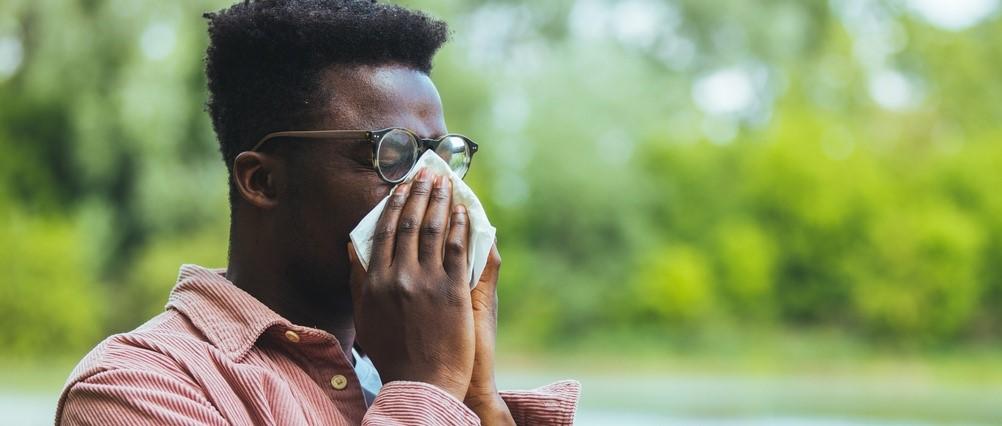
Why do some people suddenly develop hay fever?
Peer reviewed by Dr Krishna Vakharia, MRCGPLast updated by Amberley DavisLast updated 8 May 2024
Meets Patient’s editorial guidelines
- DownloadDownload
- Share
- Language
- Discussion
If you're asking "why have I suddenly developed hay fever" this spring, you're not alone. For many, the warmer weather can bring about the unwanted symptoms of hay fever - even if they've never experienced these symptoms in the past.
In this article:
Video picks for Hay fever
Why have I suddenly developed hay fever?
It's a common myth that hay fever is something that always develops in childhood. Around 1 in 5 people with this condition develop hay fever symptoms for the first time when they're over 20. So what might cause us to develop hay fever and how can we manage our symptoms?
The chance of developing an allergic reaction is in your genes. Around 1 in 3 adults in the western world are thought to be potentially susceptible to developing an allergy. However, this is only a susceptibility - many people born with these tendencies will never go on to develop active symptoms.
Dr Runa Ali, consultant physician in Allergy and Asthma in London: says: "Most people only carry antibodies to viruses and bacteria. But 1 in 3 people also carry antibodies to common things such as pollen or peanuts. However, of this number, only one half will go on to develop real-life symptoms."
What is hay fever?
What are the triggers for allergies?
Back to contentsWe know that some people are susceptible to allergies such as hay fever in later life. However, why some of us go on to develop an active allergy is not yet fully understood.
"Theories about what might shake up your immune system include suffering a severe infection like pneumonia, being exposed to pollution or going through hormonal changes," says Ali.
"However, even if we identified the people who were susceptible, it wouldn't give us any warning about who will end up being allergic and who wouldn't. In fact, if you knew you could react to a certain allergen, you might avoid it - this can be counter-productive, as exposing yourself might keep you tolerant."
This is completely different for people with a proven allergy, especially severe ones such as anaphylaxis, where total avoidance of any exposure to the allergen is important.
The important thing is to remember that an allergy, like hay fever, may develop at any time. If you start experiencing symptoms of hay fever or another allergy, make sure you speak with your pharmacist or doctor for advice.
Continue reading below
What are the symptoms of hay fever?
Back to contentsThe main symptoms of hay fever are:
Watery, irritated, or itchy eyes.
Congestion or a runny nose.
Coughing and sneezing.
However, people who don't realise they can develop hay fever as an adult might assume they have a cold - and without the right remedies or approach, may be dealing with the symptoms for several weeks unnecessarily.
This could also make things worse. People whose symptoms are drawn out may also go on to develop secondary symptoms such as tiredness, irritability, headaches and low mood.
On the other hand, some people who have been diagnosed with hay fever may write off other symptoms they are experiencing, assuming they are also to do with their allergy. However, this is not necessarily the case and any new or unusual symptoms should be treated with individual concern.
"It's important to remember that typical hay fever symptoms are very mild," explains Ali. "People need to remember, too, that hay fever symptoms are primarily airway-related and there aren't often strange symptoms that go with it."
Can you prevent hay fever?
Back to contentsThere's no way to prevent hay fever or another allergy if you are born with a susceptibility. However, there are plenty of remedies that will relieve your symptoms.
If you think you may be suffering from hay fever, there are both over the counter and prescribed - that can soothe your symptoms. These include:
Steroid nasal sprays - for a blocked and bunged-up nose.
Antihistamines - usually in the form of tablets and eye drops.
Decongestants - in the form of nose sprays and drops.
Immunotherapy - may help people with more severe symptoms.
If you find that over the counter measures are not helping, book in with your doctor to check whether you have hay fever, or to see if something else is going on like sinusitis.
Continue reading below
How can we protect ourselves against hay fever?
Back to contentsAs well as taking any prescribed or recommended medication, there are other things you can do to reduce your risk of symptoms.
"The pollen count is often higher at night, so if you suffer from hay fever you should try to sleep with the windows closed," advises Ali.
"When you drive, it's also helpful to use the air conditioning rather than opening the windows. Taking holidays by the sea where the grass pollen count is low is a good idea, as is avoiding overly grassy areas when possible. Finally, wearing glasses or sunglasses can provide some protection for your eyes."
While you can't control whether you develop hay fever, by knowing that the condition can develop at any age, you're more likely to seek the right help in time for the season.
Taking medication and sensible precautions should mean that you can get outside and enjoy the warmer weather.
Patient picks for Hay fever

Allergies, blood and immune system
Hay fever injection: is Kenalog safe?
For 1 in 4 people, warmer weather marks the beginning of an annual struggle against hay fever. The Kenalog hay fever injection has previously offered relief to many in the UK, but the potential risks of this jab has caused the NHS to stop prescribing it. Concerns over side effects have even spurred the UK government to ban social media adverts - although some companies continue to breach this law. We explore the safety concerns of getting the hay fever jab elsewhere.
by Amberley Davis

Allergies, blood and immune system
Hay fever: How to cope with a 'pollen bomb'
With the warmer weather, the tempting smell of barbecues is floating through our windows - but that’s not the only thing in the air. Levels of pollen are always higher in the warmer months - and when we have periods of hot and dry days we may get what is called a pollen bomb.
by Lydia Smith
Continue reading below
Article history
The information on this page is peer reviewed by qualified clinicians.
Next review due: 6 May 2027
8 May 2024 | Latest version
18 Mar 2019 | Originally published
Authored by:
Gillian Harvey

Ask, share, connect.
Browse discussions, ask questions, and share experiences across hundreds of health topics.

Feeling unwell?
Assess your symptoms online for free
Sign up to the Patient newsletter
Your weekly dose of clear, trustworthy health advice - written to help you feel informed, confident and in control.
By subscribing you accept our Privacy Policy. You can unsubscribe at any time. We never sell your data.